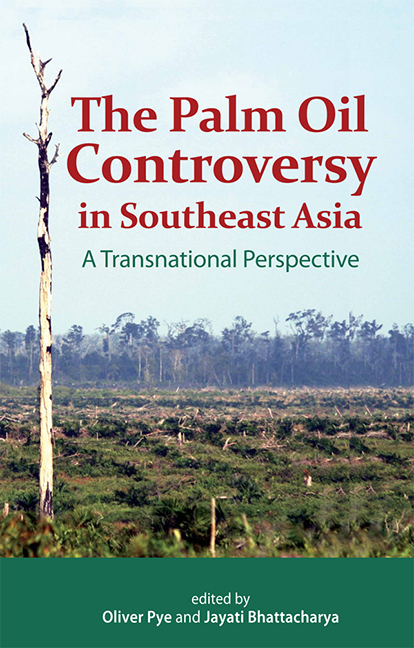Book contents
- Frontmatter
- Contents
- Foreword
- Preface
- Contributors
- Abbreviations
- 1 Introduction
- 2 Malaysian Corporations as Strategic Players in Southeast Asia's Palm Oil Industry
- 3 The Political Ecology of the Indonesian Palm Oil Industry
- 4 Evolutionary Change in the Oil Palm Plantation Sector in Riau province, Sumatra
- 5 Contradictions of Palm Oil Promotion in the Philippines
- 6 The Political Economy of Migration and Flexible Labour Regimes: The Case of the Oil Palm Industry in Malaysia
- 7 Migration and Moral Panic: The Case of Oil Palm in Sabah, East Malaysia
- 8 Reconciling Development, Conservation, and Social Justice in West Kalimantan
- 9 An Analysis of Transnational Environmental Campaigning around Palm Oil
- 10 EU Biofuel Policies and their Implications for Southeast Asia
- 11 Leveraging Product and Capital Flows to Promote Sustainability in the Palm Oil Industry
- 12 Free, Prior, and Informed Consent? Indigenous Peoples and the Palm Oil Boom in Indonesia
- Index
- Plate section
7 - Migration and Moral Panic: The Case of Oil Palm in Sabah, East Malaysia
Published online by Cambridge University Press: 21 October 2015
- Frontmatter
- Contents
- Foreword
- Preface
- Contributors
- Abbreviations
- 1 Introduction
- 2 Malaysian Corporations as Strategic Players in Southeast Asia's Palm Oil Industry
- 3 The Political Ecology of the Indonesian Palm Oil Industry
- 4 Evolutionary Change in the Oil Palm Plantation Sector in Riau province, Sumatra
- 5 Contradictions of Palm Oil Promotion in the Philippines
- 6 The Political Economy of Migration and Flexible Labour Regimes: The Case of the Oil Palm Industry in Malaysia
- 7 Migration and Moral Panic: The Case of Oil Palm in Sabah, East Malaysia
- 8 Reconciling Development, Conservation, and Social Justice in West Kalimantan
- 9 An Analysis of Transnational Environmental Campaigning around Palm Oil
- 10 EU Biofuel Policies and their Implications for Southeast Asia
- 11 Leveraging Product and Capital Flows to Promote Sustainability in the Palm Oil Industry
- 12 Free, Prior, and Informed Consent? Indigenous Peoples and the Palm Oil Boom in Indonesia
- Index
- Plate section
Summary
Migration as the act of crossing jurisdictional (state) borders and as being influenced by push and pull factors in sending and receiving countries is a well-established area of study (Lee 1966, p. 50; Martin 1991, p. 177; Hugo 1995, p. 283; 1998, p. 1), but has been met with renewed interest in more recent work on borderlands and metaphoric borders (Tagliacozzo 2007, p. 3, Abraham and van Schendel 2005, pp. 18–19). For the state, migration raises problems of citizenship which has so far been equated with the rights of the inhabitants of a country. The flood of workers from neighbouring countries, whether legal or illegal, creates problems when they are not citizens and yet have rights as workers, requiring a rethinking of issues of citizenship entitlements, if not of citizenship itself (Castles and Davidson 2000, pp. 91, 184). In the study of borderlands and metaphoric borders, analysis of the shaping and reshaping of identity/ies, and the legality or illegality of social action, takes account of notions of agency and creativity among both migrants and actors in the host society (Abraham and van Schendel 2005, pp. 24–25, Tagliacozzo 2007, pp. 6–7). Consequently, border areas are viewed as places of opportunity for migrants as well as for specific groups in the host society such as those in the service industry as well as the “immigration industry”. This chapter benefits from this latter trend in the way migration is viewed as operating within a metaphoric borderland, and as producing creative power for both migrant groups and actors in the host society.
Much of the labour required in oil palm plantations in Malaysia is supplied by migrant workers (see Saravanamuttu, this volume, for a discussion of this overall phenomenon). Plantation labour in Sabah is largely from neighbouring Indonesia (especially Bugis) and a sprinkling from the Philippines. Yet migrants are not well received by sections of the population that view their presence as politically or economically threatening. In the newspapers, migrants are presented as opportunists who test the tolerance of locals by overusing facilities and services that citizens enjoy for free. They are also viewed as cheats who allegedly use fake identity cards to gain citizenship rights.
- Type
- Chapter
- Information
- The Palm Oil Controversy in Southeast AsiaA Transnational Perspective, pp. 140 - 163Publisher: ISEAS–Yusof Ishak InstitutePrint publication year: 2012

